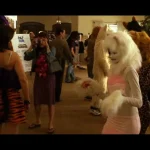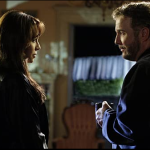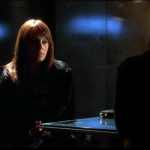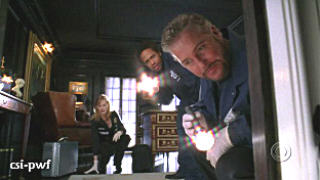
CSI‘s episode “King Baby” (S05E15) is another Jerry Stahl co-written episode, which focuses on another sexual kink, infantilism/ageplay/ABDL (adult baby/diaper lovers).
A Las Vegas casino boss, Bruce Eiger, turns up dead outside of his mansion, with a broken neck. Eiger, it turns out, was blackmailing the elite of Las Vegas.
Eiger’s wife, Donna, found him dying on the driveway from a broken neck, and allowed him to die, rather than live as a quadraplegic and make her even more at his beck and call.
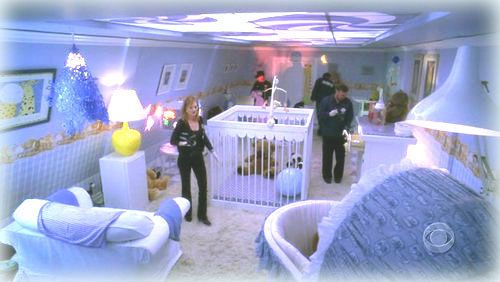
Eventually, the CSI’s find that Eiger had an entire hidden room in his mansion set up as a nursery, complete with adult-sized baby furniture. The investigators voice their surprise, while Grissom maintains his usual air of detached intellectualism.
C.S.I. Swing Shift Supervisor Catherine Willows: Wow! Just when you had thought you’d seen it all.
Warrick Brown: People live in fear with this guy?
C.S.I. Night Shift Supervisor Dr. Gil Grissom: Imagine the fear he lived with.
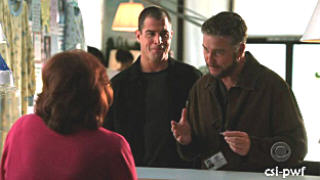
Later, Grissom and Nick visit a retail store for ABDL goods. (I doubt that such a brick-and-mortar operation exists anywhere in the world.)
(Grissom and Nick walk into the adult baby store. They walk over to the counter.)
MADGE: Howdy.
GRISSOM: Well, howdy. I was wondering, do you carry adult diapers?
MADGE: Oh, we sure do. (She looks at Grissom.) What are you, about a 34, 36?
(Nick smiles.)
GRISSOM: Well, they’re not for me.
MADGE: Oh. (She looks at Nick.) Well, aren’t you lucky to have such a nice daddy?
(Nick’s smile fades fast. Grissom turns and looks at Nick, a huge smirk on his face. Nick glances at Grissom. He looks at Madge and smiles.)
This repeats a common trope of investigators being mistaken for participants of sexual subcultures.
MADGE: Are you with Vice? Because nothing here is illegal. It’s simply nurturing. Mommy and adult baby playit’s not erotic.
GRISSOM: Well, Freud had a somewhat different theory, but …
MADGE: Well, I could take you to my playpen.
(Grissom glances behind him.)
GRISSOM: You know, I don’t think the department would let me expense it.
(She smiles.)
MADGE: Okay, then, I’ll just cut to the short version. Some guys can never love any woman but their mother. And some never had a mother who loved them.
(Camera holds on Grissom.)
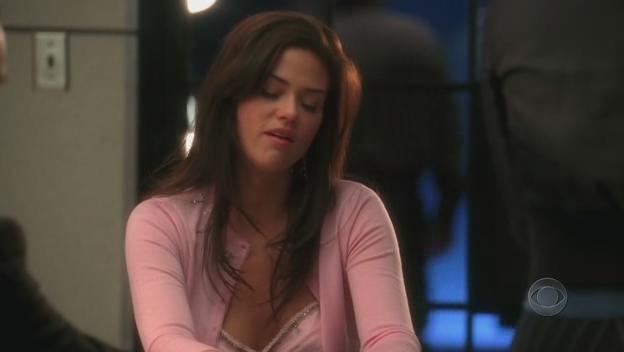
The twist comes with the discovery there was another person in Eiger’s mansion, his actual “caretaker.” This turns out to be a younger woman, Tanya, who was Eiger’s mistress. Her real baby had been sent away by Eiger and secretly adopted out of state. He also kept her lactating. After five years of weekly sessions, Tanya anally dosed him with LSD and goaded him into believing he could fly so he would jump off the balcony. It emphasizes the lack of sympathy for Eiger that the two women he was closest to both wanted him to die so they could get away from him.
“King Baby” repeats some of the cliches about submissive/masochist kinks common to this type of episode. First, infantilism is presented as an exclusively male condition; not a single mention of female ageplayers or adult babies. Second, it is explained as a pathology of the wealthy and powerful, not something a low- or medium-status man would do.
Gil Grissom: It’s only the truly powerful that have the luxury to relinquish power.
Thirdly, it presents masochism and submission as basically selfish, and such a man must pay or coerce women into this kind of dynamic. It doesn’t consider what the caregiver, male or female, would get out of such a scene.
As is common to Stahl’s episodes, the root of Eiger’s psychological dysfunction is revealed to be a “bad mother”. A detective interviews Eiger’s elderly mother, apparently on her deathbed.
Mrs. Eiger: Do you know what my mother told me when I had Bruce?
Brass: What’s that?
Mrs. Eiger: “Suckle the baby, cuckold the man”.
Brass: I don’t follow.
Mrs. Eiger: You were breast-fed.
Brass: Yeah.
Mrs. Eiger: My mother was a firm believer that the way you raised a boy was to make him hard. To let him know what the world was like right out of the womb.
Brass: And what’s the world like?
Mrs. Eiger: No free lunch. All these mothers coddling their toddlers. Look where we are.
Brass: Yeah, look where we are.
Based on this episode and others written by Stahl, I suspect that when he pitched these story ideas to the producers of CSI, he had just heard of these kinds of sexuality. He didn’t do any interviews or deep research, and based the stories on his own speculations.
As often with CSI, there’s an end-of-episode scene in which the investigators talk about what they have witnessed.
Grissom: Where would you go if you had the connections and the cash to go anywhere you wanted?
Brass: I hear Fiji’s nice.
Grissom: Eiger went further. He went all the way back to his childhood.
Brass: Yeah. I think I’d take Fiji.
Other characters question whether the two women were culpable for Eiger’s death, but the show effectively shrugs and says that is for the courts to decide, not police officers or CSIs. Grissom, as usual, takes a detached perspective that gives him at least the appearance of empathy for the socially marginal but saves him from having to take a moral or political position. Infantilism should not be condemned, but the story establishes that Eiger did plenty of illegal (and reprehensible) things.
I would argue that the episode’s focus on the shock value of the infantilism obscures that, particular kinks aside, Eiger was just another privileged man who abused women.
The British psychological horror film The Baby (1973) depended on the fear of being infantilized by an overpowering female force. (See also Stephen King’s Misery.) “King Baby” goes the opposite direction and emphasizes the fear of being ruled by what is effectively an omnipotent male infant. In Alcoholics Anonymous jargon, people with “King Baby Syndrome” are narcissists who “often exhibit immature behaviour patterns similar to those seen in young children who want their needs met immediately and without question—hence the term “King Baby”.”
